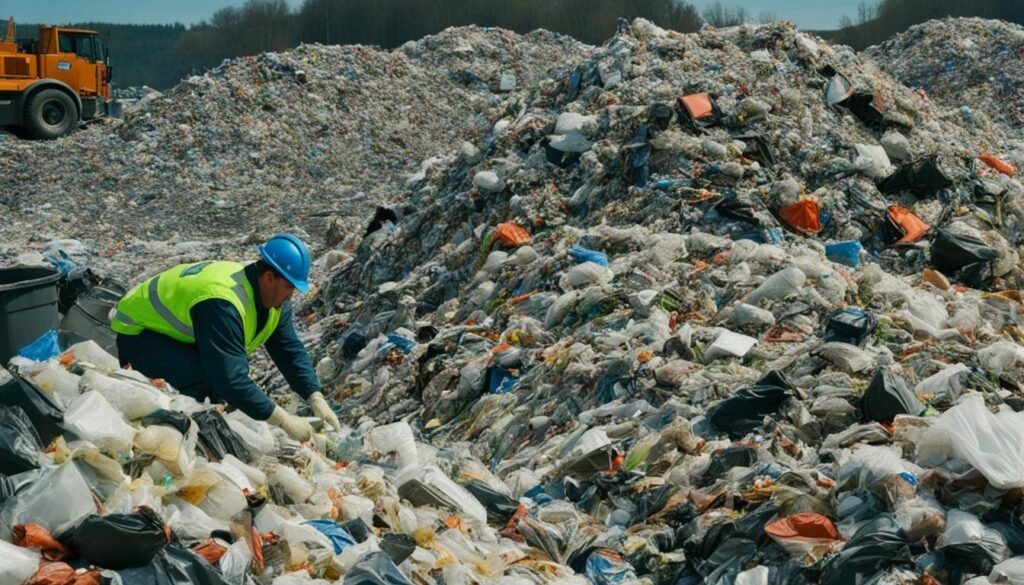Did you know that in the United States alone, over 292 million tons of waste were produced in 2018? That’s as heavy as more than 160 million cars!
Waste management is a big issue. It faces many challenges that slow down efforts to reduce waste. Some obstacles include a lack of money, poor infrastructure, and not enough public awareness.
Dealing with hazardous and electronic waste is a huge problem. It can harm human health and the environment. Also, bad waste management practices pollute the environment and make climate change worse. To tackle these issues, we need clever and green waste management ideas.
Key Takeaways:
- Each year, the United States generates over 292 million tons of waste.
- Hazardous and e-waste disposal is a significant challenge in waste management.
- Poor waste management practices contribute to environmental pollution and climate change.
- Addressing waste reduction challenges requires innovative and sustainable waste management systems.
- Creating a sustainable future necessitates raising public awareness and implementing effective waste reduction strategies.
The Major Challenges in Waste Management
Effective waste management matters a lot for our planet and our future. But, it faces big hurdles that slow its effectiveness and impact. These issues include:
Lack of Collection Infrastructure
Not having enough collection systems is a big problem. In lots of places, poor waste collection leads to littering and illegal dumping. This causes pollution and poses health risks.
Insufficient Funding
Money issues also trouble waste management. With not enough funds, it’s hard to provide good collection and disposal services. This lack of money stops us from putting in place better waste management methods and building the necessary infrastructure.
Resistance to Waste Management Procedures
Sometimes, people, businesses, and local authorities resist waste management methods. This can come from not knowing better, false ideas about waste practices, or not wanting to change habits.
Limited Recycling Options
Another issue is not having enough recycling options. In many places, there isn’t enough recycling infrastructure. So, less gets recycled, and more waste goes to landfills.
Impact of Climate Change
Climate change affects waste management too. It changes how much waste we produce and how we transport and dispose of it. Extreme weather events, becoming more common, also mess up waste management efforts.
To beat these challenges, we must focus on sustainable waste management. We need better collection systems, more money, more awareness, and more recycling options. These are vital steps to improve waste management.

| Challenges | Causes |
|---|---|
| Lack of Collection Infrastructure | Inadequate waste collection systems |
| Insufficient Funding | Limited financial resources |
| Resistance to Waste Management Procedures | Lack of awareness and misconceptions |
| Limited Recycling Options | Inadequate recycling infrastructure |
| Impact of Climate Change | Increasing frequency of extreme weather events |
Solutions for Overcoming Waste Reduction Challenges
To tackle waste reduction, raising awareness and getting people involved is key. We need to teach and engage everyone to grow a culture focused on less waste and sustainability. These are key solutions for reducing waste.
1. Education and Training Programs
Offering education and training is vital for promoting less waste. It teaches people how to cut down on trash, making them more aware and eco-friendly. Topics can include recycling, turning waste into compost, and buying wisely.
2. Infrastructure Development and Collaboration
Building better infrastructure is crucial for managing waste well. Systems that separate and collect waste properly can lower landfill waste. Working together with waste companies and local groups can improve recycling and collection.
3. Change Management
It’s important to overcome resistance when trying to cut waste. Good communication and training help get people and workers to support eco-friendly waste habits. Getting everyone on board and showing them the benefits of reducing waste can lead to positive changes.
4. Expanding Recycling Programs
Growing recycling programs is key for less waste. Making recycling easy and available helps keep a lot of trash out of landfills. Clear rules and info on how to recycle can make more people want to do it.
Creating a Culture of Sustainability
To really reduce waste long-term, we must foster a sustainable lifestyle. This means choosing reusable items, supporting eco-friendly packaging, and backing systems that keep resources in use. Making waste reduction a group effort can bring lasting eco-friendly change.
By focusing on education, better infrastructure, changing habits, and enhancing recycling, we can tackle waste management issues. This will bring us closer to a future that’s sustainable.

Adding a relevant image can make the article more attractive and engaging.
Conclusion
It’s crucial to tackle waste reduction to build a sustainable future. We must face challenges like poor awareness and lack of resources. Overcoming these barriers needs teamwork, learning, and investing in new tech.
Working as one, we can cut down on waste and aim for a greener tomorrow. Adopting eco-friendly waste practices reduces pollution and combats climate change. This effort protects our Earth for the generations to come.
Every person and business must join in reducing waste. By trying out new methods and starting eco-friendly projects, we can make a big difference. Together, let’s aim for a future with less waste, saved resources, and a flourishing environment.
